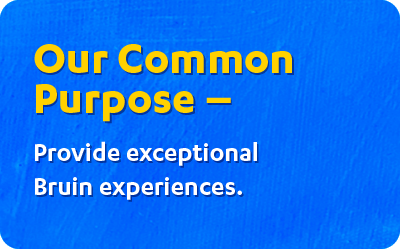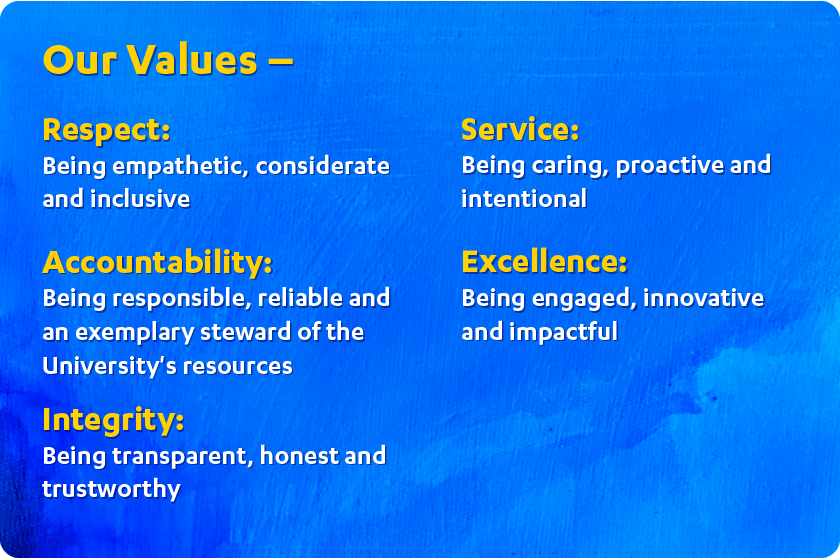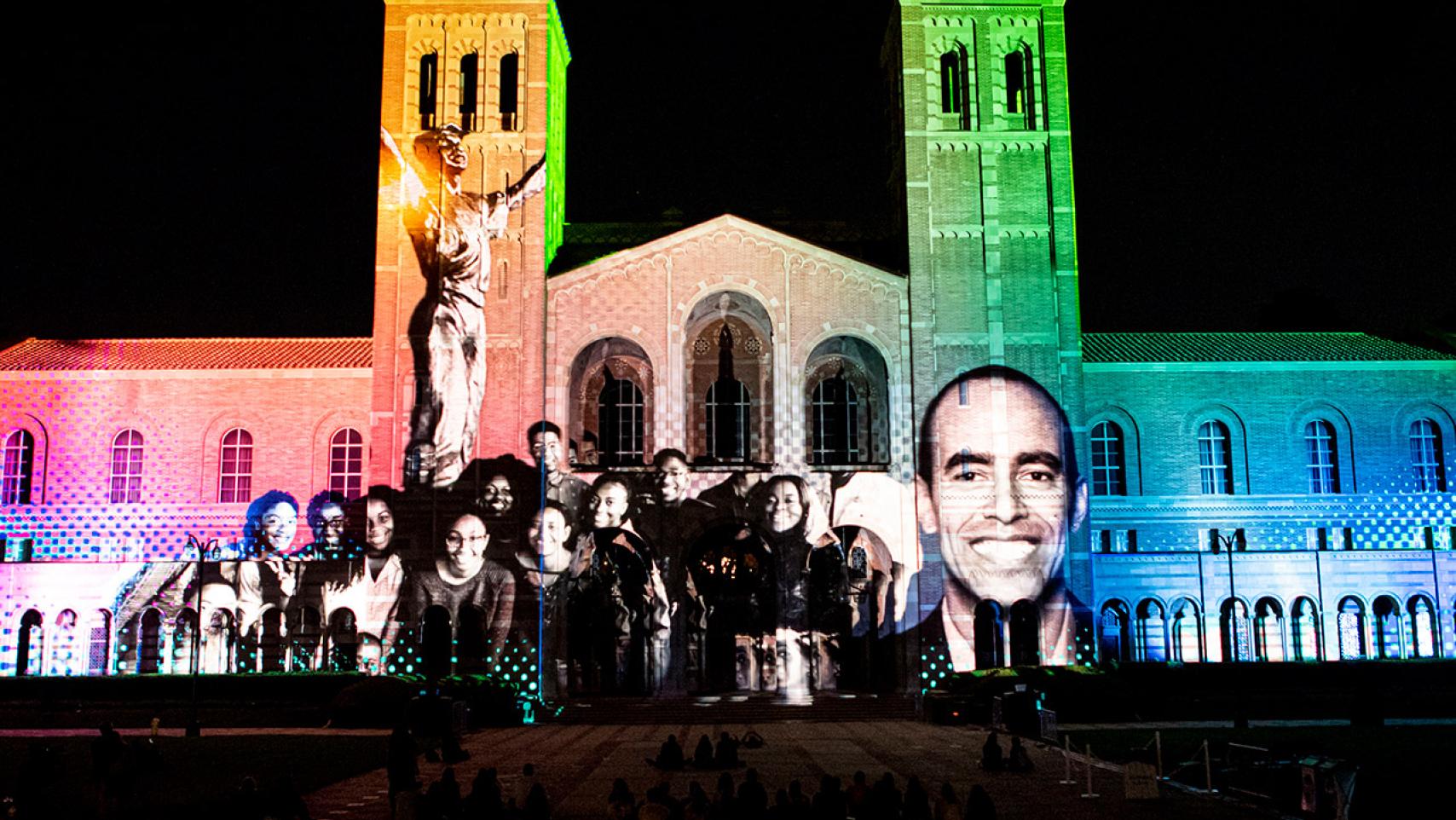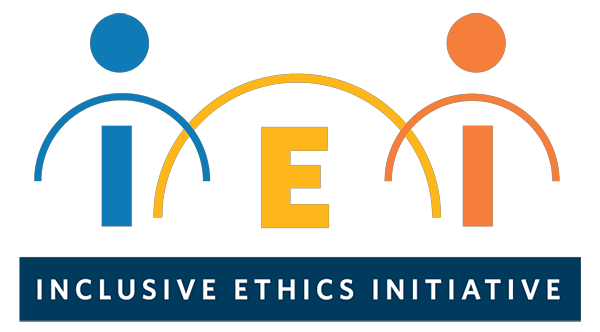In this report
Administration Mission, Vision and Values
Key Strategic Priorities Overview
Optimizing Technology for Work and Learning Environments
Promoting Organizational Efficiencies and Effectiveness to Create Service Excellence
Physical Spaces and Sustainability Practices
There are major shifts occurring in higher education that are influenced by rapid technological advancement, changing student demographics, and dynamic global challenges. UCLA is poised to not just adapt but thrive amidst these changes. In support of the UCLA Strategic Plan, Administration’s vision is to create strategic partnerships to sustain an operational infrastructure that enables UCLA’s excellence with unparalleled service, innovation and effectiveness.
As a collective unit, the departments within Administration, understands the changing landscape in higher education requires a vision that embraces technology as a facilitator for streamlining processes, enhancing connectivity, and fostering digital literacy across all levels. Due to the trending shift in demographics, it is equally important to recognize that this landscape is rich in diversity and therefore operational strategies must intentionally integrate actions that ensure equity and inclusivity in all endeavors. Lastly, responding to these rapid changes necessitates a more agile governance structure that makes data-informed decisions and creates transparency and clarity in its work to maintain alignment with strategic objectives.

Data-driven decisions
As an operational entity that supports the various facets of the University, Administration is responsible for many important coinciding objectives. Strengthening our use of data to gain better insight into operational priorities and our effectiveness in meeting them, will enhance our ability to produce impactful results.

Technology Optimization
A major path towards operational efficiency is optimizing the use of technology in our core services. Assessing and implementing opportunities to automate processes and consolidate information into shared systems can reduce administrative burden, allow for comprehensive analysis, create operational savings, and maximize our talent resources.

Sustainable Workforce and Work Practices
Committing to the overall wellness of the organization and its talent is a function of sustaining a positive work environment. This is operationalized through intentional actions toward safe and healthy work practices, talent growth and development, continuous process improvement, and eliminating waste.

Service Excellence
As the primary service partner for the campus, Administration must consistently deliver high-quality service standards and proactively identify and implement innovative solutions that enable exceptional Bruin experiences.

Technology and space management are vital elements to enhancing the learning, teaching and work performance of our students, faculty and staff. The following initiatives utilize technology and data as support structures to teaching and learning through adoption of inclusive teaching modalities, purposeful integration of technology in course design principles, and modernizing learning spaces throughout the campus. The transformation of the teaching and learning environment is going to necessitate more than just an assessment of the technology requirements. It will also entail evaluation of the physical space to ensure it can accommodate technology upgrades and space utilization.
- Enable the core academic mission of the University to flourish by providing educators and students with the technology needed to deliver/receive an optimal teaching and learning experience, both in-person and virtually. Elements of this will include improved asynchronous technology, produced teaching content and virtual classroom tools enabled within the LMS. To date, a partnership has been established with the Teaching and Learning Center (TLC) and a draft of the Academic Technology charter is under review by the TLC leadership.


- Launched GenAI website to help the campus community use AI safely and ethically, in line with UCLA’s values.
- Piloted two peer review tools (Peerceptiv) for faculty that was a collaboration between the Bruin Learn Center of Excellence and UCLA’s Teaching and Learning Center.
- Piloted a course evaluation tool, Explorance Blue, in three courses. After a successful pilot, there are plans to expand its use and replace the Scantron evaluations by 2026.
- Manage physical and virtual classrooms, specialized learning environments, outdoor study spaces and other learning spaces (i.e., conference spaces, dormitories, libraries, dining halls, etc.). Ensure all spaces on campus are suitably equipped with functional and innovative technology that meets the needs of the evolving educational experience and enables the world-class teaching and learning for which UCLA has been internationally recognized. Manage the installation and long-term management of display technology across the university. Build a roadmap for classroom transformation and charter a digital campus program to elevate the audio-visual experience in general assignment classrooms.


- Upgraded wireless network in twelve General Assignment classrooms to address performance issues, increase user capacity, and improve the use and reliability of teaching and learning tools like iClicker and other engagement tools.
- Expand the management of physical space data across campus locations, including off-campus and residential properties by extending the space inventory processes to include campus space assignment and control; determination of current space utilization; projections of future space needs; space utilization standards and analysis and alignment of space utilization with budget model.

- Added Rentable Square Feet (RSF) field for reporting of leased commercial real estate in compliance with UCOP mandate to ensure accurate lease data reporting and providing valuable support to campus leadership in making well-informed decisions on leased spaces.
- Added subcodes to space use definitions to enhance the granularity of space data, which helps with campus-wide operations.
- Documented objectives for data capture and analytic processes to ensure data is accurate, consistent, and reliable, providing a solid framework for collecting spatial data, leading to accurate analysis, and minimizing errors. Clearly defined objectives have made the data analysis process more efficient, contributing to better decision-making and strategic planning. For the campus, this translates to improved resource allocation, operational efficiency, and the ability to track and achieve institutional goals.
- Completed the benchmarking and documentation of best practices in space inventory management across UC campuses, which helped identify effective strategies that can be applied across our campus, leading to improved space tracking and reporting, potentially resulting in better space utilization, cost savings, and enhanced facility management.
- Design and implement projects conducive to business process technology optimization.


- Completed beta release of new campus map, Concept 3D, allowing eleven key stakeholders across campus to update their layer/category information on the map and to embed links for additional information.
- Migrated nearly 6,000 phone lines and 30 auto-attendants/phone trees to Zoom Phone enhancing convenience, flexibility, and collaboration for remote and hybrid work and teaching.
- Identified and disconnected approximately 5,000 phone lines, resulting in an annual savings of around $1M for customers, while increasing sustainability by reducing hardware and updating equipment for more reliable performance.
- Implemented system changes and integrations to support the use of lived names in official records and communications, ensuring that all campus systems, including student information systems and email platforms, accurately reflect students' preferred names.
- Completed system configuration needed to transition email delivery from the on-campus forwarding service to Google email and preparing 50,500 users to make necessary updates to their email forwarding settings, ensuring minimal disruptions.
- Explore the feasibility and applicability of Artificial Intelligence Large Language Models (AI LLMs) in reviewing internal and external injury/incident data, scientific literature, UCLA policies/documents, and regulatory guidance/requirements. The objective of this effort is to expand staff capacity by automating administrative processes; better informing staff; and using document generation tools to draft guidance documents, such as safety bulletins.


- Completed feasibility study for AI for Safety. Completed injury and illness data analyses of workers comp data for both H&H and FM. Proof of concept for AI Chatbot and for Safety SOP development tool is sound and will need further IT infrastructure development to roll out.
- Develop and implement a data-driven, risk-based framework to optimize campus space utilization and align heating, cooling, and building maintenance based on actual utilization. This model will promote greater accountability by guiding investments in flexible work environments and ensuring that space is allocated according to equitable standards and clearly defined outcomes.




Administration’s priority to create sustainable work practices involves assessing operational processes and streamlining activities to reduce administrative burden and/or add value to the overall outcome. Successful implementation of these efforts not only promotes a high-performing work environment but can lead to better utilization of resources, including existing talent, which can positively influence current recruitment and retention challenges. Similarly, intentional actions related to energy conservation and reduction of the campus carbon footprint can improve energy efficiencies that lead to financial savings and reduced maintenance. The following initiatives support Administration’s strategic priorities and the Goal 5 pillar of Becoming a More Effective Institution.
- Identify and guide process improvement efforts on both the campus and local levels.
- Launched three continuous process improvements within Facilities Management. (OED & FM)
- Consolidation of FSR Ticketing Process to remove administrative burden placed on campus partners and streamline internal management of requests to expedite work assignment, removing potential delays and/or rework.
- Reorganize and streamline the Warehouse/Inventory process to make materials/tools readily available to avoid delays in service, restocking the warehouse with current materials that are in high demand but not easily accessible through other purchasing mechanisms (e.g., order/shipped directly from vendor). It also aims to modernize maintenance of and access to inventory by automating current manual activities in the workflow.
- Implement a pilot program to demonstrate energy conservation approaches that will reduce energy consumption, automate processes, standardize protocols, and show cost savings opportunities. This effort is critical to maintaining the central plant capacity, addressing escalating energy costs, and meeting UCOP sustainability energy mandate of 2% consumption reduction annually.
- Develop learning workshops to increase knowledge and practice of continuous process improvement.


- Develop a process and system to collect continuous improvement opportunities and to track implemented efforts campus-wide.




- Deploy HR/IT systems optimization program, which involves three major systems implementations to enhance HR internal processes and improve service delivery.



- Implement an improved HR Service Delivery system (Service Now HRSD) that integrates with other HR/IT systems to simplify access to HR services, improve efficiency, and optimize user experience for clients and individual employees.
- Implement a new applicant tracking system (iCIMS Talent Cloud) that integrates with other HR/IT systems to modernize and streamline the talent acquisition process.
- Implement a new Job Builder solution with JDXpert to replace PeopleAdmin, which makes it easier to create job descriptions and classify new positions.
- Consolidate and upgrade HRPOC document management system and fully integrate from departmental initiator to final CHR approvals.
- Completed three HR system implementations (partnership between CHR and ITS).
- Bruin CHR Service Center Phase 1 launched 12/7/23. This effort was undertaken to simplify access to services, improve process efficiency, and optimize user experience for client departments and individual employees. Service count at year-end included 13,144 submitted cases with 12,248 cases closed. There were 12,000+ employee center portal sessions, 59,000+ page views, and 135 HR department representatives submitted cases.
- JDXpert launched 3/12/24. This job builder solution provides a robust position description repository, a simplified process for creating and updating position descriptions, and a workflow engine to make the classification and reclassification process more efficient and user-friendly. At year-end, there were 1,767 workflow requests opened; 1,120 workflow requests closed; 150+ data migration stakeholders engaged; 121 organizations and departments represented; 6900+ position description transferred to JDX.
- iCIMS, in partnership with Administration Marketing and Communications (AMC), was launched on 3/26/24. This solution was implemented to streamline the talent acquisition process. Since its launch Spring quarter, there were 603 job/requisitions opened and 25,970 applications received.
- Enable the following business transformation efforts:
- Implement ASCEND, in partnership with Finance and Research Administration, to modernize and streamline financial management by replacing the mainframe financial system with Bruin Finance supported by Oracle Financials Cloud.



- Implement ASCEND, in partnership with Finance and Research Administration, to modernize and streamline financial management by replacing the mainframe financial system with Bruin Finance supported by Oracle Financials Cloud.
- Launched BruinBuy Plus, a new procure-to-pay system powered by Jaggaer technology, replacing the legacy BruinBuy system to enhance efficiency, visibility, and user-centered experiences.
- Supported the BruinBuy Plus Stabilization by addressing over 80,000 outstanding invoices through optimization and enhancements, successfully clearing 99% of the backlog with a dedicated task force.
- Implement FACET, in partnership with the Financial Aid Office, to migrate UCLA’s outdated legacy financial aid services to a sustainable modern cloud-based platform. Deliver student-centric processes, an improved student, and staff portal, as well as an integrated and automated system built to ensure compliance, accuracy, improve processing times, and to better support a customer-oriented team.



- Completed 2024-2025 financial aid year mainframe updates and training driven by FAFSA Simplification requirements.
- Enabled a single data environment for storage and analysis, as part of Goal 5.
- Reduce life cycle costs for University Vehicles and improve productivity by updating and increasing the use of Fleet Services Technology.


- Enhanced tool for evaluating and reporting on University vehicle life cycle costs to better visualize utilization trends and cost-saving opportunities. Completed internal working draft of protocols for University vehicle use and acquisition. Completed placeholder vehicle replacement list for FY25
- Define and establish EH&S role and responsibilities in transforming UCLA Safety culture through a branding campaign that communicates EH&S as a critical partner in proactively managing safety on campus.

- Audit and improve campus-wide MAQ Program to ensure that all campus buildings storing flammable and toxic materials are in compliance with the California Fire Code (CFC) within a 6-year timeframe established by systemwide MAQ Task Force.

- Participated in several outreach events to promote safety on campus (Dentistry Research Fair, JRSI Safety Fair, H&H Wellness Fair, Lab Safety Week). Hired two Chemical Inventory Specialists to assist with MAQ Program improvement efforts and completed assessment for fire control zones in two buildings thus far.

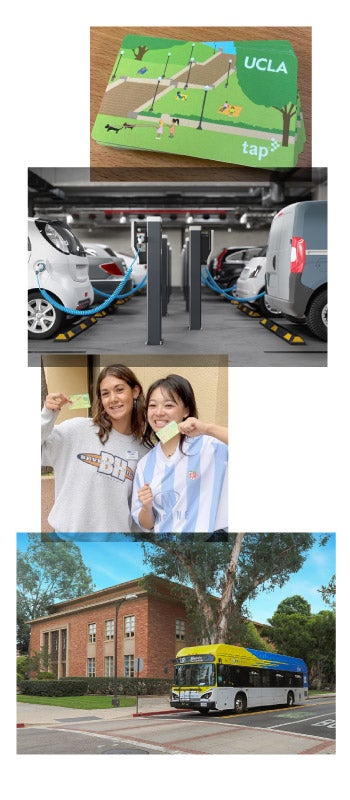
Administration operations evaluate the connections that people have to the campus and continually look for enhancements to improve student, faculty, staff, and/or guest experiences.
- Provide an affordable and accessible public transit option for all Bruins.

- Create the U-Pass program to fulfill the undergraduate referendum to self-tax for transit passes for all undergraduate students.
- Assist the Graduate Student Association (GSA) in successfully completing the public transit referendum to continue the Bruin Grad Pass program, which provides transit passes for all graduate students.
- Reached highest participation rate in overall transit pass program at UCLA in FY23-24. Increase was buoyed by both undergraduate and graduate student bodies participating in their student fee funded programs, along with a slight increase in employee participation. Effective marketing provided by Administration Marketing and Communications supported the observed increase.
- Introduce virtual TAP passes via smartphone for greater convenience and efficiency.
- Introduce virtual TAP passes via smartphone for greater convenience and efficiency.
- Condense local transit pass products into one offering. The current BruinGO (covers Big Blue Bus and Culver City Bus) and GoMetro (covers Metro Bus and Rail) local transit passes are legacy products that no longer reflect the intent of E&T’s transit pass programs, nor do they serve well the multi-agency commuting patterns of many Bruins. The two local pass products will be combined into one transit pass which will serve all employee public transit needs, providing service on twenty-seven public transit agency routes across L.A. County.
- Implemented Tier One Transit Pass in Winter quarter of 2024. Enhanced marketing efforts supported by Administration Marketing and Communications resulted in significant growth in program participation, reaching 320 customers in Spring quarter, an increase of 207 participants since Fall quarter 2023.
- Use technology to provide customers with information and optimal paths and modes of travel to and from campus, including their final destination on campus.


- Identified new mobile wayfinding platform (Vicinia Compass) and began pilot phase on two new applications to enhance service experience on campus and to create efficiencies in parking operations.
- Started pilot implementation of a camera-based automated occupancy sensor and guidance system and a sensor-based occupancy system that allows us to automate space counting to better predict parking trends and improve daily allotment and event-based sale structures.
- Implemented Offstreet, which is an app-based parking sales platform that allows for presales at certain types of special events and for campus departments and other end users to more efficiently and quickly validate courtesy parking.
- Develop EV infrastructure, policies, and procedures to support the EV community of commuters as well as the Campus EV fleet.

- Created a Policy subcommittee to develop a guide describing fundamental aspects of UCLA’s EV Policy, Procedures and Plans, including the development of a comprehensive series of EV Charging Use Cases.
- Applied for funding under the California Energy Commission's highly competitive EnergIIZE grant program that supports expansion of electric vehicle service equipment availability statewide and was awarded a $750,000 grant to support full electrification of the Transit Fleet, including electrical make-ready work at the Transit Yard along with installation of 16 networked DC fast chargers for buses
- Maximize and improve utilization of space on the Hill to improve student and guest experiences. Due to shifts in office space utilization resulting from the pandemic and attrition there is inefficient use of common and office spaces. There are opportunities to enhance the student and guest experience by repurposing existing spaces including recreating student rooms to increase bed count.



- Convened a Space Committee to facilitate needs assessment and space evaluation to repurpose spaces on the Hill to add value to guest experience and/or increasing bed inventory through the repurposing of underutilized spaces.
- Completed assessment of operations in Housing Administration Building to transform the former Housing Services Office into a centralized mailroom. Drawings and design are complete and the project is anticipated to go out to bid in March 2025 for completion for Fall 2026.
- Optimize technology to improve ease of access to campus ticketed events by integrating Single Sign-On (SSO) capability for faculty staff and implementing a SMS-based communication/sales software.


- Removed administrative burden through
- significant reduction of credit card chargebacks from $350,000 in FY22-23 to $33,000 in FY23-24. This reduction was the result of added security features through CTO’s integrated ticketing system that reviews validity of charges.
- elimination of box office cash transactions at all non-Athletic events. This process improvement reduced cash deposits, eliminated the need for police escorts for transporting cash and reduced the need for storing cash funds in office.
- Expand services to students and guests to increase revenue, operational efficiencies, or increase student take rates to recover from pandemic losses, adapt to staffing shortages, and increase reserves to support Initiative Five of increasing access to affordable housing.


- Improve access to food for all students.
- Increase staffing to deliver more meals and increase capacity for catered events.
- Expanded “pop-up” food offerings including a host “pop-up” style at FEAST 5 days a week (total diverted swipes = 247,905); created a student run dessert and gelato service at Café 1919 (total diverted swipes = 73,721); continued partnerships with ASUCLA (diverted swipes = 1,183,359) and various Food Trucks (828,476) to absorb needed covers. Efforts to market these new offerings were supported by Administration Marketing and Communications.
- Increased service efficiency by implementing mobile orders, contributing to a 7% increase in total swipes over FY22-23.
- Addressed structural staffing shortages by increasing starting wages for Senior Food Service Workers (Step 3/$20.26), Assistant Cooks (Step 14/$25.16), and Cooks (Step 15/$25.66); creating 100% FTE positions; increased referral bonus from $750 to $1000; eliminated English language proficiency test; and made condition offers ahead of background checks, contributing to a decrease in position vacancies from 42% to 14% in the Dining operations, where the staffing shortage was most evident.
- Increase affordable housing inventory for students and faculty through acquisition and development of additional housing offered at below-market rents to increase access to the UCLA experience.


- Increased affordable housing inventory.
- Bought 2 additional houses and 4 townhomes to increase faculty housing.
- Acquired 901 Levering for $17M ($1M tax credit) for a redevelopment project that will add 900 beds at $275M.
- Secured offer to purchase a new apartment building (Canfield), which will add 140 graduate student beds for Fall 2004.
- Gained Design Development and Regental project approval to complete Gayley Towers Redevelopment project, and started construction.
The following initiatives focus on the safety and security of the University’s data assets as well as effective network performance at the main campus and all UCLA-owned properties.
- Adopt a UCLA-wide data governance model that establishes standards related to data policies, storage, and use. Enable a single data environment for storage and analysis. Complete an advanced analytics proof-of-concept with an academic school partner to leverage academic data supporting course planning.



- Finalized the data and analytics charter, identified and invited committee members, and will kick off the first meeting in August after EVCP Hunt sends the official charge letter.
- Enabled a single data environment for storage and analysis, as part of Campus Strategic Plan Goal 5.
- Implement a multi-year program with initiatives segmented into a phased approach to address key external and internal data security threats.


- Apply a balanced approach to streamline data security solutions that maintain privacy and security, uphold creativity and professional autonomy, and protect UCLA’s resources.
- Ensure university assets are inventoried and classified.
- Improve UCLA’s overall data security risk protection capabilities.
- Modernize UCLA’s approach to identity and access management.
- Submitted UCLA’s Security Investment Plan in compliance with UCOP systemwide mandate.
- Completed the Incident Response Plan and Executive Leadership tabletop exercise.
- Partnered with Audit and Compliance to begin efforts to formally inventory and classify UCLA assets.
- Created the Unit Information Security Leads (UISL) operating model.
- Recovered 100% of critical data and services from the Life Sciences ransom attack. Additionally, ITS helped to fortify the LS network and infrastructure to better defend against ransom attacks in the future.
- Redesign the campus-wide network to improve security, availability, performance, and reliability. Create a roadmap for a network of the future that is reliable and performant, creating an excellent and consistent experience from all corners of campus and UCLA owned properties. Unify campus networks into this roadmap and new network, introducing innovations in managing UCLA’s network through automation, more secure design, and leading-edge architecture.


- Conducted campus-wide requirements gathering exercise to support network architecture and design efforts.


Caring for the physical infrastructure of the campus is at the core of Administration’s strive for service excellence. This involves ensuring that regulatory compliance is met and improvement efforts are implemented with a sustainability framework.
- Implement utility & regulatory compliance initiatives.


- Initiate and complete a state-funded Decarbonization Study initiative to produce a strategy for a 90 percent or greater reduction in scope 1 emissions from fossil gas use in campus energy systems. This rigorous study will identify multiple scenarios to replace fossil fuel-based energy sources with renewable alternatives, with a focus on electrification. Scope includes high level estimates of total capital and operational costs/savings, just transition (fact sheet) and other equity considerations as well as identifying opportunities for applied research and education and gaps for future planning. Our strategic initiative is to contribute technical expertise and data to this study to create a roadmap to guide UCLA toward a sustainable future.
- Completed the Campus Decarbonization Study in collaboration with Facilities Management. The study was led by consulting firm WSP and the Decarbonization Task Force. A draft of the Executive Summary has been shared for feedback through townhalls and a Bruin Post to the campus community. The final report will be completed and submitted to the Fossil Free UC Task Force by July 31, 2024.
- Implement the regulatory Co-gen Rain Water Capture Project intended to meet or exceed all stormwater discharge requirements as prescribed by the California Regional Water Quality Control Board (RWQCB), Los Angeles Region. The project scope is to capture 100% stormwater runoff at the Cogen/FM Building roof and re-circulate it into the Cogen cooling towers via a series of new storage tanks, pumps and other required infrastructure.
- Completed the major requirements (99% complete) for the Co-Gen Rain Water Capture Project. Tanks and piping have been installed. Achieved all the requirements established in the consent decree with the WQCB & Waterkeepers.
- Implement the Cogen Re-Power Project to replace aged cogen turbines with modern, efficient, and cleaner burning systems.
- Implement the Campus Hydrodynamic Separator Installation project to meet the assigned waste load allocation (WLA) of “zero trash discharge” into the campus storm drains, as prescribed by the California RWQCB, which requires removal of trash greater than or equal to 5 mm from the Campus stormwater conveyances. This project will bring UCLA into regulatory compliance. The scope of includes land surveying, geotechnical investigation, piping, electrical work and the installation of a Hydrodynamic Separator System to intercept trash being conveyed by UCLA storm drains and includes excavation at three proposed locations on campus: Botanical Gardens; Westwood Plaza at Le Conte Ave.; and Intersection near Charles E. Young Dr. South and Gayley Ave.
- Implement an energy conservation pilot program that will evaluate and recommend alternative strategies to address campus energy demands that reach or exceed central plant capacity (summer peaking), which is impacting operations and reliability.


- Launched a continuous process improvement (CPI) effort in partnership with Organizational Effectiveness & Development (OED). A team has been established to implement the effort and current state workflow maps have been documented to identify bottlenecks in the process thus completing the first phase of the project.
- Increase engagement with campus partners through deployment of major programs that include Smart Buildings & Labs (SBL) project completions in Year 1 and Year 2 of the plan, along with conversion of a multi-stall GIRR in every campus building by 2025.

- Completed Phase 1 of the Smart Buildings & Labs project work in Terasaki Life Sciences Building. To date, the building has achieved an 11% reduction in average monthly energy usage and project financials showed $154,260/year avoided utility cost; $912,187 project cost; and 5.9 years simple payback. Final projections will be available after completion of Phase 2.
- Expanded the number of multi-stall Gender Inclusive Restrooms on campus from 1 to 11. Project currently paused until additional funding is allocated.
- Maximize efficiencies and utilization of state granted funds to address Deferred Maintenance Program.

- For the FY 21/22 ($52M) program, 32 of the 57 projects (56%) were completed in FY23/24. Of the 25 open projects, 13 have completion dates by December 2024.
- For the FY22/23 ($31.8M) DM Program, 13 of 29 projects (41%) were completed in FY23/24. Of the 17 open projects, 14 have completion dates by June 2025.
- Conduct comprehensive assessments of UCLA’s parking structures and infrastructure to address safety risks and operational demands, while implementing a 30-Year Debt Capacity Model to meet debt obligations, maintain cash flow, and adjust parking fees in line with inflation and rising costs for long-term financial sustainability.

- Lead development of updated Climate Action Plan based on Decarbonization Study including coordinating stakeholders through Task Force and conducting outreach. Collaborate across UC to identify funding mechanisms.

- Develop updated energy efficiency and conservation plans for FM and support auxiliary customers in initiating energy efficiency planning upon request. Work with Sustainability to support the development of an updated Climate Action Plan for UCLA. Coordinate with LADWP to prepare UCLA for early electrification efforts as part of decarbonization.

The success of an organization is dependent on its talent to meet the daily operational needs and to introduce new changes that will elevate it to the next level. Therefore, ensuring that the talent has the necessary knowledge, skills, abilities and competencies to perform to expectations is key to creating a high-performing organization. Administration has committed to developing inclusive learning pathways for its team members that consider different organizational elements, such as format (in-person, virtual, hybrid, asynchronous), type (instructor-led, coaching, mentoring), and position (management, individual contributor, student). This commitment is not only enhancing the talent’s capacity but also their level of engagement.
- Design and implement the HR Partner Leadership Academy to expand the knowledge and application of human resources industry best practices and establish a consistent process to support management and help staff collaborate and perform optimally.


- Completed needs assessment for HR Partner Leadership Academy program curriculum. Identified and agreed on course areas with HRAG. Proposed annual certificate program with post-test component is in development.
- Identify short- and long-term ELR interventions based on data analysis of trends to reduce financial and reputational risk and legal expenses at the University. Manage the implementation of a case management system to facilitate workplace investigations and generate metrics to address issues proactively via a cross-functional workgroup.



- Managed a total of 117 ELR cases at year-end. The ELR Unit consisting of three full-time workplace investigators completed 37 investigations averaging 46 business days turnaround. The Unit goal is to complete investigations within 60 University business days. Additional workplace investigations completed by ELR consultants, who perform various human resources duties, including conducting workplace investigations, completed 80 cases averaging 43 business days turnaround. (Please note: Although ELR is not assigned to handle discrimination-related or Title IX-related investigations, which are the exclusive province of UCLA’s Civil Rights Office, ELR frequently conducts investigations not pursued by the UCLA Civil Rights Office because of Complainants lack of cooperation. ELR, however, is able to quickly conduct these investigations and finds that Complainants end-up cooperating with its investigations.)
- Implement an automated, web-based system to simplify current evaluation processes, track completion and goal accomplishment, promote performance coaching, and increase employee engagement. This is a long-term initiative with the first phase focused on project initiation, strategic foundation and education.

- Implement targeted development programs (e.g., Leadership 20XX, GROW Bruins, departmental mentoring programs) to continuously strengthen organizational talent (both career and student employees), enhance employee engagement and provide exceptional Bruin experiences.


- Launched the fourth cohort for the Leadership 20XX Program, which consists of 21 participants from across Administration.
- Established partnership with UCLA Career Center to develop curriculum to address career competencies for student employees in preparation for entering the workplace after graduation.
- Culminated the third cohort of the Workplace English Program with 13 graduates from H&H and FM departments. To address the increasing participation requests, the program is being expanded to two concurrent sessions with a total of 40 enrollments within a 24-week program. A new vendor has been acquired and the program is ready to launch for Fall Quarter 2024.
- Improve Bruin Rewards and Recognition Program and integrate into the Administration Culture. Increase advocacy for and support opportunities to use recognition and rewards to drive performance, recognize achievement, and incentivize stakeholders to fulfill the performance expectations aligned with both Administration’s vision, values, strategic priorities and common purpose and the overall UCLA mission and strategic goals.


- Finalized the renewal of the Administration True Bruin Values Recognition Program.
- Increase H&H team morale by strengthening Equity, Diversity, and Inclusion effort. Design and implement employee programs to continue building EDI awareness through education, creating an equitable and diverse learning environment, and fostering skills for professional advancement.


- Expanded the implementation of emotional intelligence and diversity initiative throughout the department and increased internal training program offerings with the implementation of a four-course curriculum designed for front-line managers that included optimizing team effectiveness and a business financial series to understand hospitality financial reporting, debt model and acquisitions and proformas. In addition, CPR & AED classes were provided, which led to 24 team member certifications and two trainer certifications.
- Reimagine IT: Talent & Admin IT Consolidation.


- Reimagine IT Talent: Offer technologists clear career pathways, an effective organizational structure, and access to valuable professional development activities. These meaningful learning opportunities will enable staff to reskill and upskill while informing them of the latest industry best practices.
- Completed the new ITS Organization Design, job descriptions and compensation assessment.
- Onboarded 100 new hires and are on track to have 80% of the hiring into the new organization completed by January 2025.
- Consolidated FSPH IT support into ITS.
- Admin IT Consolidation: Rationalize services, consolidate resources, and unify IT staff by bringing together assets—housed throughout a variety of administrative units reporting to VC of Administration—and their administration under Information Technology Services (ITS). Create a holistic IT roadmap that enables excellence and consistent delivery of IT services across administrative functions.
- Completed the detailed analysis of current Administration IT work activities and performed mapping of IT needs.
- Shifted the Administration IT workforce to ITS on November 2023.
- Completed assessment and developed Administration IT modernization plan.

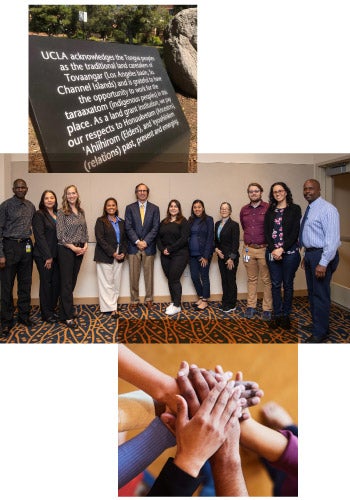
The Council is comprised of representatives from each of the seven departments within Administration with the intention of promoting an inclusive environment and aiding in the recruitment of talented individuals and the retention of a successful workforce. Their charge is to advocate for support from departmental leadership, managers, and supervisors to integrate EDI efforts at all levels of the hierarchy. The following initiatives were developed based on organizational feedback collected during Year 1 of this current strategic plan. 
- Create a hiring toolkit, improve outreach strategies and involve EDI advisors in the Housing & Hospitality recruitment and interview processes to ensure diverse candidates in the recruitment of senior roles. Facilitate more open communication channels and support committees to ensure equitable, inclusive solutions.
- Implement inclusive leadership training and enforce leadership accountability to shift perceptions of preferential treatment within Facilities Management. Revise promotion criteria and ensure transparency in recognition efforts. Continue collecting feedback from staff and create EDI committees to address situations as they arise.
- Explore options and assess feasibility for creating mentorship programs to foster stronger retention rates and encourage professional development within Events & Transportation and Environment, Health & Safety.
- Identify free or low-cost public cultural events and other activities – including volunteering opportunities – for the staff in the Office of Vice-Chancellor, Administration Marketing & Communications and Financial & Organizational Services as a vehicle to connect as a group, build trust and camaraderie, develop meaningful common experiences, and increase involvement in our communities.
Inclusive excellence is a system-wide approach that recognizes the importance of equity, diversity, and inclusion in an institution. Administration has taken initial actions to partner with UCLA Anderson School’s Inclusive Ethics Initiative, led by Dr. Heather Caruso, to understand both the conceptual aspects and practical applications of EDI in the workplace. The collaboration led to better clarity on how to approach actions for EDI-related improvements and create opportunities to achieve small wins. From this framework, initiatives around the following improvement areas will be developed in the prioritized order. 
- Create intentional communication of departmental initiatives to identify collaborative opportunities or to share lessons learned.
- Evaluate talent composition and leadership positions and be intentional in creating opportunities to develop individuals in protected categories to widen the diversity of the individuals in those positions
- Identify meaningful solutions to decrease perceived inequities in hybrid/remote work option. Gather feedback on alternative “benefits” that have value to affected employees and evaluate options that the organization can offer within policy and/or financial parameters.
- Launched the Unhoused Task Force to develop strategies for mitigating the public safety issues associated with unhoused and unaffiliated individuals on campus.


- Streamlined the process for awarding Service Milestone recognitions to eligible Administration employees. The effort increased the timeliness of the recognition allowing leadership to share the awards in close proximity to the celebratory date. Since the improvement in January 2024, 419 milestone certificates and letters have been delivered.

- Coordinated implementation of the President’s Campus Safety Plan.



- Led campus response to COVID-19 and worked with Disabled Student Union on awareness campaign.



- Internal Communications Development for Administration: AMC completed an internal communications audit for the organization and implemented a UTM tracking system to measure content performance across marketing and communications campaigns.


- Brand Development for Administration: AMC launched redesign of Administration website and developed new standardized branded YOS certificates for organization.


- Instrumental in the UC systemwide effort to obtain a temporary restraining order (“TRO”) that ended an unlawful strike that threatened to disrupt final exams and commencement activities The ELR Director and Labor Relations team staffed the picket lines every day of the strike so that direct evidence could be provided to the Office of the President in their efforts to obtain a temporary restraining order.

- Led a campus-wide effort, in response to Senate Bill No. 553 (“SB 553”), CHR’s Behavioral Intervention Team (“BIT”) implemented a comprehensive Workplace Violence Prevention Plan (“WVPP”) to recognize, prevent, and respond to workplace violence at UCLA.

- Redesigned and implemented the HRPOC New Employee Orientation (NEO) in partnership with OED and AMC. A total of 715 employees have received the revised full-day in-person session, which includes lunch with the department head of the new hire, an introduction to the organization by the Administrative Vice Chancellor and a NEO welcome kit. These new elements to the program were to ensure that new hires received the necessary introduction to transition successfully into their new position at UCLA and to create affiliation with their new environment, which is critical in a setting with Work from Home options.


- Launched new Administration strategic plan for FY24-26 and facilitated the renewal of Administration’s Mission-Vision-Values and development of the organization’s Common Purpose. Partnered with AMC on promotion of updated MVV in communications.



